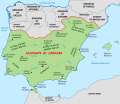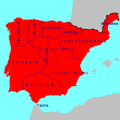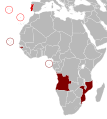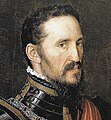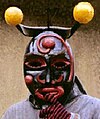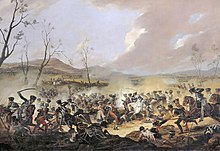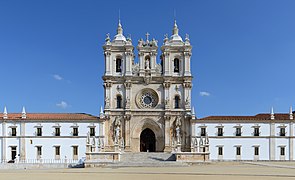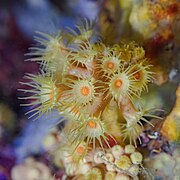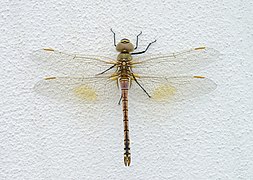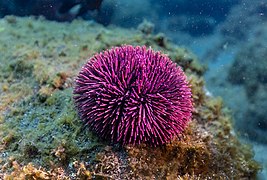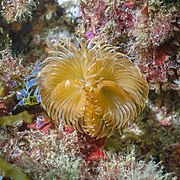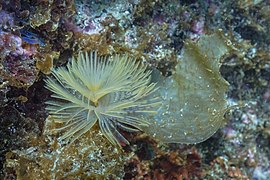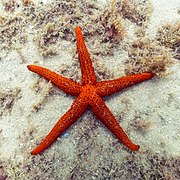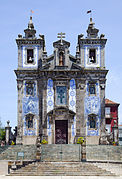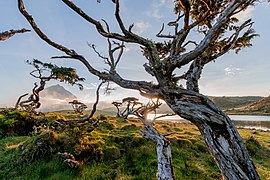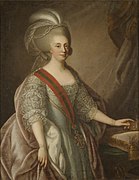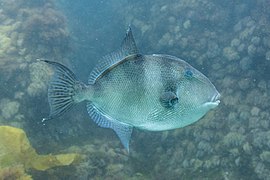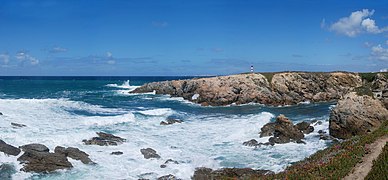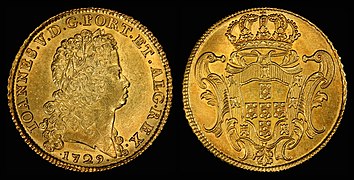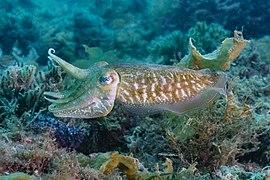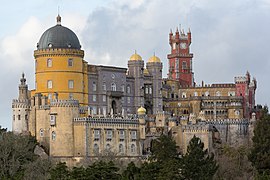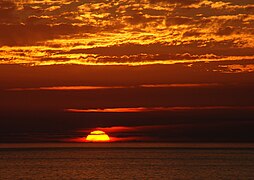Portal:Portugal
Welcome to the Portugal portal  Portugal, officially the Portuguese Republic, is a country located on the Iberian Peninsula, in Southwestern Europe, and whose territory also includes the Macaronesian archipelagos of the Azores and Madeira. It features the westernmost point in continental Europe, its mainland west and south border with the North Atlantic Ocean and in the north and east, the Portugal-Spain border constitutes the longest uninterrupted border-line in the European Union. Its archipelagos form two autonomous regions with their own regional governments. On the mainland, Alentejo region occupies the biggest area but is one of the least densely populated regions of Europe. Lisbon is the capital and largest city by population, being also the main spot for tourists alongside Porto and Algarve. One of the oldest countries in Europe, its territory has been continuously settled and fought over since prehistoric times. The territory was inhabited by the Celtic and Iberian peoples, such as the Lusitanians, the Gallaecians, the Celtici, Turduli, and the Conii. These peoples had some commercial and cultural contact with Phoenicians, ancient Greeks and Carthaginians. It was later ruled by the Romans, followed by the invasions of Germanic peoples together with the Alans, and later the Moors, who were eventually expelled during the Reconquista. First founded as a county within the Kingdom of León in 868, Portugal formally became an independent kingdom with the Treaty of Zamora in 1143. During the 15th and 16th centuries Portugal led the Age of Discovery and established one of the longest-lived maritime and commercial empires, becoming one of the main economic and political powers of the time. By the early 19th century, events such as the 1755 Lisbon earthquake, the country's occupation during the Napoleonic Wars, and the resulting independence of Brazil in 1822 led to a marked decay of Portugal's prior opulence. This was followed by the civil war between liberal constitutionalists and conservative absolutists over royal succession from 1828 to 1834. The 1910 revolution deposed Portugal's monarchy, and established the democratic but unstable Portuguese First Republic, later superseded by the authoritarian regimes of Ditadura Nacional (National Dictatorship) and Estado Novo (New State). Democracy was restored after the Carnation Revolution (1974), ending the Portuguese Colonial War and eventually losing its remaining colonial possessions. (Full article...) Selected article -The Santa Justa Lift (Portuguese: Elevador de Santa Justa, pronounced [elɨvɐˈðoɾ ðɨ ˈsɐ̃tɐ ˈʒuʃtɐ]), also called Carmo Lift (Portuguese: Elevador do Carmo, [elɨvɐˈðoɾ ðu ˈkaɾmu]), is an elevator, or lift, in the civil parish of Santa Justa, in the historic center of Lisbon, Portugal. Situated at the end of Rua de Santa Justa, it connects the lower streets of the Baixa with the higher Largo do Carmo (Carmo Square). Since its construction the lift has become a tourist attraction for Lisbon as, among the urban lifts in the city, Santa Justa is the only remaining vertical (conventional) one. Others, including Elevador da Glória and Elevador da Bica, are actually funicular railways, and the other lift constructed around the same time, the Elevator of São Julião, has since been demolished. (Full article...)This is a Featured article, which represents some of the best content on English Wikipedia.
The Rhodesian mission in Lisbon (Portuguese: Missão da Rodésia em Lisboa), the capital of Portugal, operated from September 1965 to May 1975. It was a diplomatic mission representing Rhodesia (or Southern Rhodesia), initially as a self-governing colony of Britain and, after the Unilateral Declaration of Independence in November 1965, as an unrecognised state. Rhodesia informed Britain of its intent to open a Lisbon mission headed by an accredited representative, independent from the British Embassy in the city, in June 1965. Whitehall refused to endorse the idea but Rhodesia continued nonetheless, and later that month appointed Harry Reedman to head the mission. The British government attempted unsuccessfully to block this unilateral act—Rhodesia's first—for some months afterwards. The affair came amid the larger dispute between Whitehall and Salisbury regarding the terms under which Rhodesia could be granted sovereign independence. Rhodesia's mostly white government insisted that statehood should come under the constitution introduced with Britain's approval in 1961, while Whitehall insisted that a set timetable for the introduction of black majority rule would have to be in place before the country could be fully independent. The Rhodesian government's stance on this matter caused it to become isolated within the Commonwealth, which from 1964 excluded it from most of its internal bodies, while the Rhodesian military became unofficially embargoed by its established British and American suppliers. (Full article...)General imagesThe following are images from various Portugal-related articles on Wikipedia.
Selected quote -"Lies have short legs"
A mentira tem perna curta This is a Good article, an article that meets a core set of high editorial standards.
The Battle of Orthez (27 February 1814) saw the Anglo-Spanish-Portuguese Army under Field Marshal Arthur Wellesley, Marquess of Wellington attack an Imperial French army led by Marshal Nicolas Soult in southern France. The outnumbered French repelled several Allied assaults on their right flank, but their center and left flank were overcome and Soult was compelled to retreat. At first the withdrawal was conducted in good order, but it eventually ended in a scramble for safety and many French soldiers became prisoners. The engagement occurred near the end of the Peninsular War. In mid-February, Wellington's army broke out of its small area of conquered territory near Bayonne. Moving east, the Allies drove the French back from several river lines. After a pause in the campaign, the westernmost Allied corps surrounded and isolated Bayonne. Resuming their eastward drive, the remaining two Allied corps pushed Soult's army back to Orthez where the French marshal offered battle. In subsequent operations, Soult decided to abandon the large western port of Bordeaux and fall back east toward Toulouse. The next action was the Battle of Toulouse. (Full article...)Selected Biography -José de Sousa Saramago GColSE GColCa (Portuguese: [ʒuˈzɛ ðɨ ˈsozɐ sɐɾɐˈmaɣu]; 16 November 1922 – 18 June 2010) was a Portuguese writer. He was the recipient of the 1998 Nobel Prize in Literature for his "parables sustained by imagination, compassion and irony [with which he] continually enables us once again to apprehend an elusory reality." His works, some of which can be seen as allegories, commonly present subversive perspectives on historic events, emphasizing the theopoetic human factor. In 2003 Harold Bloom described Saramago as "the most gifted novelist alive in the world today" and in 2010 said he considers Saramago to be "a permanent part of the Western canon", while James Wood praises "the distinctive tone to his fiction because he narrates his novels as if he were someone both wise and ignorant." More than two million copies of Saramago's books have been sold in Portugal alone and his work has been translated into 25 languages. A proponent of libertarian communism, Saramago criticized institutions such as the Catholic Church, the European Union and the International Monetary Fund. An atheist, he defended love as an instrument to improve the human condition. In 1992, the Government of Portugal under Prime Minister Aníbal Cavaco Silva ordered the removal of one of his works, The Gospel According to Jesus Christ, from the Aristeion Prize's shortlist, claiming the work was religiously offensive. Disheartened by this political censorship of his work, Saramago went into exile on the Spanish island of Lanzarote, where he lived alongside his Spanish wife Pilar del Río until his death in 2010. (Full article...)Selected picture - The battle of Aljubarrota took place on August 14, 1385, between Portuguese forces commanded by King John I of Portugal and his general Nuno Álvares Pereira, and the Castilian army of John I of Castile.
Did you know -
Portugal topicsPortugal lists
SubcategoriesRecognized content
Featured articles
Former featured articlesFeatured listsFormer featured listsGood articles
Former good articlesDid you know? articles
Featured pictures
Former featured portalsIn the News articles
Main page featured articles
Picture of the day pictures
Featured topicsNew articlesThis list was generated from these rules. Questions and feedback are always welcome! The search is being run daily with the most recent ~14 days of results. Note: Some articles may not be relevant to this project.
Rules | Match log | Results page (for watching) | Last updated: 2024-06-02 21:53 (UTC) Note: The list display can now be customized by each user. See List display personalization for details.
Things you can doRelated PortalsRelated WikiProjects
Associated WikimediaThe following Wikimedia Foundation sister projects provide more on this subject:
Discover Wikipedia using portals |



![Image 1Maios celebration in Madeira island [1] (from Culture of Portugal)](http://upload.wikimedia.org/wikipedia/commons/thumb/e/e1/2011-03-05_03-13_Madeira_045_Santana_%285543431418%29.jpg/120px-2011-03-05_03-13_Madeira_045_Santana_%285543431418%29.jpg)



